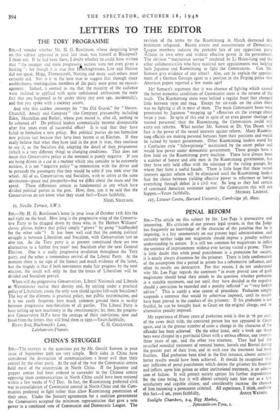CHINA'S STRUGGLE
Sra,—The answers to the questions put by Mr. Gerald Samson in your issue of September zoth are very simple. Both sides in China have considered the destruction of communications a lesser evil than their control by the other party. At the end of the war the Communist armies theld most of the countryside in North China. If the Japanese and puppet armies had been ordered to surrender to the Chinese armies opposing them communications in North China could have been restored within a few weeks of V-J Day. In fact, the Kuomintang preferred civil war to consolidation of Communist control in North China and the Com- munists preferred to fight rather than allow Kuomintang penetration of their areas. Under the January agreements for a coalition government the Communists accepted the minimum representation that gave a veto power to a combined vote of Communist and Democratic League. The revision of the terms by the Kuomintang in March destroyed this minimum safeguard. Recent arrests and assassinations of Democratic League members indicate the probable fate of any opposition party Without its own army and without effective power in the government. The obvious " meritorious service " rendered by Li Hsien-liang and the other collaboraticnfsts who have received new appointments was helping both Japanese and Kuomintang to fight the Communists. Can Mr. Samson give evidence of any other? Also, can he explain the appoint- ment of a German Gestapo agent to a position in the Peiping police that American papers reported a few weeks ago?
Mr' Samson's argument that it was absence of fighting which caused the better economic conditions of Communist areas is the reverse of the truth. The Kuomintang areas were behind a regular front that changed little between 1939 and 1944. Except for air-raids on the cities there was no fighting at all in most of them. The main Communist bases were penetrated by Japanese " mopping up " offensives on the average about twice a year. In spite of this and in spite of an even greater shortage of trained personnel than the Kuomintang, the Communists could still carry out reforms. What neither Mr. Samson or Dr. Van Dusen will face is the power of the vested interests against reform. Many Kuomin- tang officials are making personal fortunes from their positions and would be ruined by honest government. Other Kuomintang leaders stand for a Confucian style " fuhrerprinzip " maintained by the secret police and would lose power under democratic government. These groups have a firm hold on the Kuomintang party machine. There have always been a number of honest and able men in the Kuomintang government, but they have only held office with the tolerance of the ruling groups, for whom they form a useful facade. There is little hope that these vested interests against reform will be eliminated until the Kuomintang leaders face the choice between yielding effective power to reformers or losing everything through defeat in a civil war. So long as they feel certain of continued American assistance against the Communists this will not 125, Littauer Centre, Harvard University, Cambridge 38, Mass.






























 Previous page
Previous page